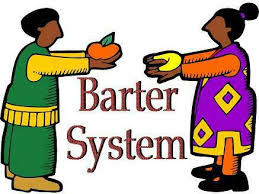Barter System


Before the development of money, exchange was based on the direct exchange of goods and services. This is known as barter. Barter involves the direct exchange of goods for some quantity of another good. In the case of goods for goods, for example, one cow can be exchanged for a horse or 3 sheep for 4 goats. There should be a double coincidence of wants for a transaction to take place under the barter system. For example, if the owner of a horse wants a cow, he has to find a person who not only has a cow but is willing to exchange it for a horse. In other cases, goods are exchanged for services. A doctor may be paid as payment for his services. For example, he may be given a rooster, or some wheat or rice or fruits. Thus, barter economy is a moneyless economy. It is also a simple economy where people produce goods either for self consumption or for exchange with other goods that they want.
Difficulties of Barter
The barter system is the most inconvenient method of exchange. It involves loss of time and effort of people in trying to exchange goods and services. As a method of exchange, the barter system has the following difficulties and disadvantages:
1. Lack of Double Coincidence of Wants: The functioning of the barter system requires a double coincidence of wants on the part of those who wish to exchange goods or services. It is necessary for a person who wishes to trade his goods or services to find another person who is willing not only to buy his goods and services but also to possess those goods in accordance with his prior needs. For example, suppose a person has a horse and he wants to exchange it with a cow. In the barter system, he has to find out a person who not only has a cow but also wants a horse. The existence of such a double coincidence of wants is a remote possibility.
2. Lack of common measure of value: Another difficulty under the barter system relates to the lack of a common unit in which the value of goods and services should be measured. Even if two persons wishing well for each other happen to meet by chance, the problem arises as to in what proportion the two goods should be exchanged. As there is no common measure of value, the rate of exchange will be arbitrarily fixed according to the intensity of demand for each other’s goods, as a result, one party will suffer a loss in the terms of trade between the two goods.
3. Difficulty in storing value: Another problem of the barter system is that a person has to store a large quantity of his goods in order to exchange his desired goods with others day to day. Take the example of a farmer who has produced wheat. Obviously, he will use some quantity of wheat for his own consumption and keep some quantity for getting other essential goods by trading with others. If he wants furniture, he will go to a carpenter who is willing to trade furniture in exchange for his wheat. Similarly, if he wants cloth, he has to trade with a weaver who is willing to give cloth by acquiring wheat etc. So the farmer must first build a warehouse to keep stock of his wheat so that at the time of need he can transact for the commodity he wants. But in the early days of civilization, building and maintaining a warehouse was itself a very difficult task.
4. Lack of division of commodities: Some commodities are not physically divisible into smaller pieces. Suppose, a person has a cow and he wants commodities like cloth, grain etc., how much cow can be traded for cloth; how much cow can be traded for food grain? It was very difficult to determine this as the cow cannot be divided into many pieces.
5. Difficulty in making deferred payments: In barter economy, it is difficult to make payments in the future. Since payments are made only in goods and services. Lack of durability in goods caused many problems in future payments. Due to the above problems, the barter system could not continue for long. As human civilization progressed, people realized that there should be some common medium of exchange that could be easily carried, stored and used to express the value of a commodity. So money came into existence. Hence the need for money arose due to the failure of the barter system.
Read Also:
- Money: Concept, Functions and Role
- 5 Functions Of Money
- What Is Money
- Evolution Of Money
- Currency: What is it, How it works, and How it relates From money
Recent Posts
Discussion About Health Risks Due To Mobile Phone Use
According to an early study from the University of Toledo, the blue light emitted by…
Health Risks Due To Mobile Phone Use
Mobile phones are becoming an increasingly important component of our daily lives. It is one…
Mobile Phones Risks On Health
Mobile phones are becoming an increasingly essential component of our daily lives. It is one…
Apple iOS 18.4 New Release Date: Sweeping iPhone Update Drops Anytime Now
The next big Apple iPhone update is iOS 18.4, with new Apple Intelligence features —…
When Your Samsung Galaxy Phone Will Get Android 15-Based One UI 7
Samsung Galaxy fans have been waiting for the grand One UI 7 update based on…
Private Job: Vacancy For Associate Content Writers In Physics Wallah; 1 Year Experience Required, Work From Home Job
Edtech company, Physics Wallah has released a vacancy for the post of content writers. This…

